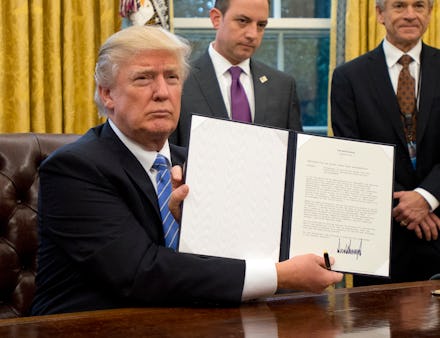Why is the TPP bad for American workers? 4 arguments against

President Donald Trump signed an executive order Monday pulling the United States out of the Trans-Pacific Partnership, fulfilling one of his main campaign promises and drastically shifting what had been a long-standing bipartisan approach to free trade in Washington, D.C. The move is one of the few where progressives frequently side with Trump, with former Democratic presidential candidate Bernie Sanders also campaigning on rejecting the deal.
Here are some of the arguments against the TPP, focused on how it could hurt American workers:
More jobs could move overseas
It’s pretty simple: TPP makes it easier for American companies to move manufacturing jobs to other countries where labor is cheaper. This results in fewer jobs for Americans. The legacy of the North American Free Trade Agreement is often pointed to as proof positive of this effect.
The copyright and patent provisions protect corporations
The deal would strengthen copyright and patent laws. One area where this could hurt is in the pharmaceutical arena, where it will be even harder for competition to create lower-cost alternatives to pricey drugs.
It was created by corporations
The agreement was made in consultation with corporate lobbyists, but without much input from workers or consumer groups. That should be seen as evidence that the deal is favorable to corporations at the expense of consumers and laborers.
The environmental positions aren’t great
Though there are some provisions in the TPP to protect the environment, they are voluntary and generally seen as less than meaningful. Anyone who cares about the environment and climate change should have trouble supporting the agreement.
All in all, there is a strong progressive case to be made against the Trans-Pacific Partnership. While some of Trump’s reasons for rejecting the agreement may not be the same as the left’s – notably protecting American corporations from foreign competition and a general sense of corporate nationalism – even the most battle-hardened lefty would have to concede that this may be a rare area of agreement with the new administration.